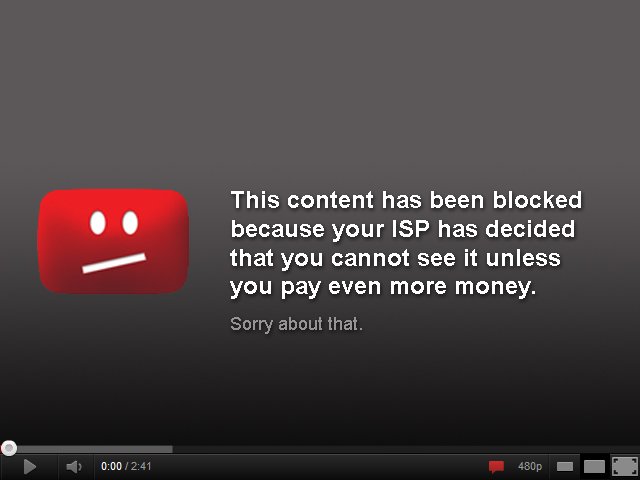
Hey, you’re reading this, so you use the Internet.
And since you use the Internet to at least frequent the pinnacle of online music journalism, chances are you’ve recently come across banners on some of your other favorite sites alluding to an imminent vote by the Federal Communications Commission (FCC) to unravel current rules asserting net neutrality, which are presently the only thing preventing companies like Comcast (a.k.a. the devil) and AT&T (a.k.a. the devil’s hunchbacked sibling) from incorporating egregious throttling standards and establishing internet “fast lanes” in the U.S.
Basically, if implemented, these idiotic new standards would just plain SUCK; at least according to anyone who isn’t a telecom exec or a willful Luddite who lives off the grid and has a best friend made out of pine cones…so naturally, people from virtually every other demographic are speaking out and literally protesting against the possibility of an increasingly restricted World Wide Web. (Did you know musicians are people too? I just found this out!!!)
Accordingly — in advance of the net neutrality repeal vote, which scheduled for tomorrow morning (Thursday, December 14) at 10:30 a.m. EST — hundreds of musicians and dozens of independent labels have signed a pro-net neutrality statement sponsored by the nonprofit organizations Future of Music Coalition and CASH Music. You can read the full (read: ENORMOUS) list of signatories here, but among the list of those who consider an open internet integral to music and its promotion to a wider audience, Deerhoof, Holly Herndon, Ian MacKaye, and Killer Mike all formally agree. Labels like Thrill Jockey, Sub Pop, and Temporary Residence also gave the statement their John Hancock.
Read the full letter below, and ready your anger if something terrible happens tomorrow!
Dear FCC Chairman Ajit Pai:
As musicians, composers, producers, and independent labels representing diverse backgrounds, traditions, genres, and communities, we urge the Federal Communications Commission to protect the open internet as a vehicle for free expression and collaboration.
We’ve built careers and big parts of our lives around our passion for music—creating it and connecting with listeners. Today, the internet is one of the primary places this work happens. We rely on it for everything from booking tours to selling merchandise, to collaborating with musicians on the other side of the globe. The fundamental principle of openness online has enabled artists to connect directly with each other and with audiences, empowering us to distribute our work and reach fans in a multiplicity of ways. At its best, the open internet has allowed for a flourishing of diverse voices, allowing to compete alongside the biggest companies, creating connections across geographic barriers, offering choice, flexibility, and creative autonomy.
To truly make good on the remarkable democratic potential of the internet, the fundamental infrastructure underpinning it all must be neutral and nondiscriminatory. Unfortunately, the FCC’s current proposal would amount to a sharp turn in the opposite direction. It would allow big cable and wireless companies to create new pay-to-play fast lanes, disadvantaging those who cannot pay for preferential treatment, and replicating the industry’s past problems with payola. Allowing broadband providers to control this once-open platform shifts leverage away from individual artists, creators, and small businesses, and interferes with freedom of speech and expression.
The implications for free expression also extend to digital service providers. Without strong net neutrality protections, digital retailers will have to compete to better meet the needs of the ISPs that can block, throttle, or slow down access to their offerings. These services should instead be competing to better serve the needs of diverse musicians and listeners. Artists and labels’ choices about how and where to bring their work to the market could likewise be constrained by what the ISPs prefer, rather than what works best for their individual business and creative goals.
Of course, network neutrality alone is not sufficient to ensure a healthy internet, where free expression thrives, creative labor is fairly compensated, consumer privacy is respected, and diverse voices can reach audiences. But it is a necessary foundation for fair competition.
We urge the FCC to sustain the existing, strong net neutrality rules, based on Title II of the Communications Act. The FCC should maintain bright line rules against blocking, throttling, and paid prioritization on both fixed and mobile connections, as well as maintaining ongoing oversight of other types of discrimination.
